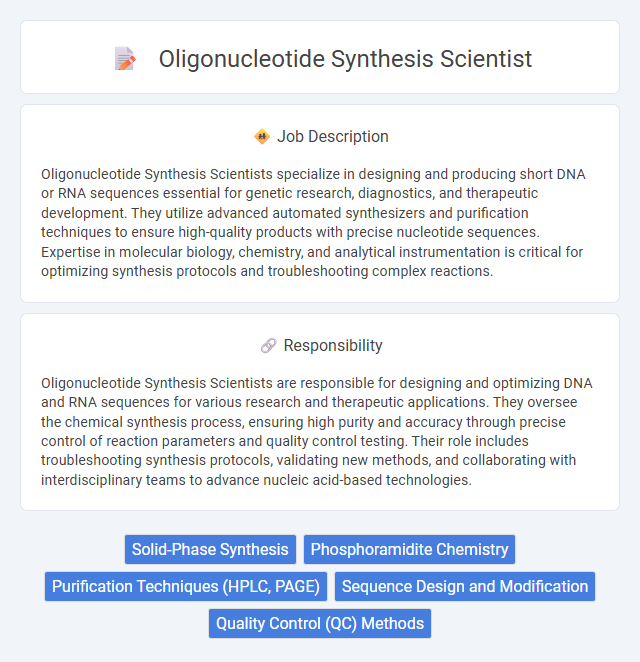
Oligonucleotide Synthesis Scientists specialize in designing and producing short DNA or RNA sequences essential for genetic research, diagnostics, and therapeutic development. They utilize advanced automated synthesizers and purification techniques to ensure high-quality products with precise nucleotide sequences. Expertise in molecular biology, chemistry, and analytical instrumentation is critical for optimizing synthesis protocols and troubleshooting complex reactions.
Oligonucleotide Synthesis Scientist roles will likely suit individuals with strong attention to detail, patience, and proficiency in molecular biology techniques. Those comfortable working in controlled laboratory environments and handling precise chemical processes may find this position fitting. However, candidates prone to stress in meticulous or repetitive tasks might face challenges adapting to the demands of this job.
Qualification
Oligonucleotide Synthesis Scientists require a strong background in organic chemistry, biochemistry, or molecular biology, typically demonstrated by a bachelor's or advanced degree in these fields. Proficiency in solid-phase synthesis techniques, nucleic acid chemistry, and analytical instrumentation such as HPLC and mass spectrometry is essential. Experience with laboratory automation, process optimization, and quality control protocols enhances the ability to develop and produce high-purity synthetic oligonucleotides for research and therapeutic applications.
Responsibility
Oligonucleotide Synthesis Scientists are responsible for designing and optimizing DNA and RNA sequences for various research and therapeutic applications. They oversee the chemical synthesis process, ensuring high purity and accuracy through precise control of reaction parameters and quality control testing. Their role includes troubleshooting synthesis protocols, validating new methods, and collaborating with interdisciplinary teams to advance nucleic acid-based technologies.
Benefit
Oligonucleotide Synthesis Scientist roles may offer significant benefits, including opportunities for advanced research in genetic and pharmaceutical applications that enhance career development prospects. Access to cutting-edge laboratory technology and collaborative environments could improve skill sets and innovation potential. Competitive compensation packages and potential for involvement in pioneering projects might increase job satisfaction and long-term career growth.
Challenge
The role of an Oligonucleotide Synthesis Scientist likely involves overcoming complex challenges related to optimizing synthesis protocols for high purity and yield. Maintaining precision in automated synthesis equipment and troubleshooting reaction inconsistencies may present consistent difficulties. Success in this position probably depends on balancing innovative techniques with stringent quality control standards.
Career Advancement
Oligonucleotide Synthesis Scientists drive innovation in synthetic DNA and RNA production, crucial for biotech and pharmaceutical advancements. Mastery in automated synthesis techniques and quality control empowers progression to senior research roles or project leadership in gene therapy and diagnostics development. Expertise in oligonucleotide chemistry and process optimization opens pathways to managerial positions in specialized nucleic acid manufacturing companies.
Key Terms
Solid-Phase Synthesis
Oligonucleotide Synthesis Scientists specializing in Solid-Phase Synthesis utilize automated synthesizers to assemble nucleotide sequences with high precision and efficiency. Expertise in phosphoramidite chemistry and optimization of coupling, capping, and oxidation steps ensures high yield and purity of DNA and RNA oligonucleotides. Proficiency in troubleshooting synthesis protocols and analyzing quality metrics such as HPLC and mass spectrometry is critical for successful production of research- and therapeutic-grade oligonucleotides.
Phosphoramidite Chemistry
Expertise in phosphoramidite chemistry is essential for an Oligonucleotide Synthesis Scientist, focusing on the precise assembly of nucleotides into custom DNA and RNA sequences. Mastery in optimizing coupling efficiency, as well as controlling reaction conditions like detritylation and oxidation, directly impacts the purity and yield of synthesized oligonucleotides. Proficient application of solid-phase synthesis techniques and in-depth knowledge of protective group strategies facilitate advancements in therapeutic, diagnostic, and research oligonucleotide production.
Purification Techniques (HPLC, PAGE)
Oligonucleotide synthesis scientists specialize in the purification of synthesized sequences using advanced techniques such as High-Performance Liquid Chromatography (HPLC) and Polyacrylamide Gel Electrophoresis (PAGE). HPLC enables precise separation and quantification of oligonucleotides by exploiting their chemical properties, ensuring high purity and consistency for downstream applications. PAGE offers high-resolution purification by size, enabling the isolation of full-length products from truncated sequences critical for research and therapeutic development.
Sequence Design and Modification
Oligonucleotide Synthesis Scientists specialize in designing precise nucleotide sequences to optimize hybridization fidelity and functional performance in applications such as PCR, gene editing, and therapeutic development. Expertise in sequence modification techniques, including incorporation of chemically modified bases and conjugates, enhances stability, specificity, and cellular uptake of oligonucleotides. Mastery of advanced synthesis platforms and bioinformatics tools ensures the creation of high-purity, sequence-specific oligonucleotides tailored for cutting-edge biological research and clinical use.
Quality Control (QC) Methods
Oligonucleotide Synthesis Scientists specialize in developing and implementing rigorous Quality Control (QC) methods to ensure the purity, integrity, and correct sequence of synthetic DNA or RNA strands. Advanced analytical techniques such as high-performance liquid chromatography (HPLC), mass spectrometry, and capillary electrophoresis play a crucial role in detecting synthesis errors and verifying molecular weight. Precision in QC protocols guarantees compliance with industry standards and supports the production of oligonucleotides for therapeutic, diagnostic, and research applications.
 kuljobs.com
kuljobs.com